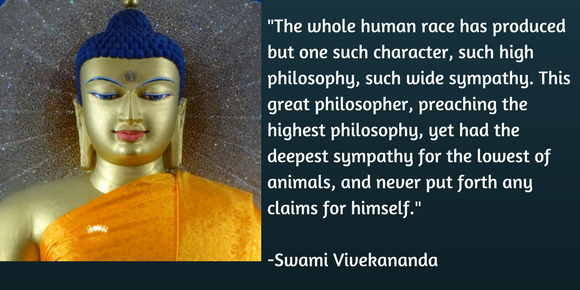A person’s character and thoughts are formed from a very early age. It is generally a product of many influences spread over many years. Our knowledge acquired from readings, interacting with people from different backgrounds and events from our own experience shape our thinking and make us into who we are. Swami Vivekananda was such a multifaceted personality that it would be difficult to fathom the different factors that shaped him. The influences on Vivekananda can generally be considered under three main factors.
The first was the influence of his family during his childhood. Both his parents were known to have influenced him tremendously. Swami Vivekananda in his many talks credits them for this. While his mother imbued him with the ideals of feeling nobly, thinking highly and acting rightly, his father taught him to be broad-minded, manly and to respect our national traditions. His father also constantly urged him to learn about the culture of other lands. This could have also influenced Swami Vivekananda to take to the study of the sciences, other religions and philosophies.
The next key factor that one could consider in the making of Narendra into Swami Vivekananda as the world knows him would be his extraordinary breadth of knowledge and understanding of not only the philosophical but also of matters related to science and technology. Throughout Naren’s adolescent years, one notices that he was never satisfied with mere diagrams of the Truth, no matter how clever; he wanted the Truth itself. Later in life he used to say that “True philosophy should be the mother of spiritual action, the fountain head of creative energy, the highest and noblest stimulus to the will. Short of that, it is worthless.” It was during his college days that he applied himself totally to the study of philosophy – both ancient and modern, both eastern and western. He read the philosophy of Herbert Spencer and later in life used the Spencerian mode of reasoning in his discussion of the doctrines of the Upanishads. He studied the systems of the German philosophers, particularly of Kant and Schopenhauer. He also studied John Stuart Mill and Auguste Comte and dived into the study of Aristotelian analysis and speculations. It was also during this time that he was in full rebellion against the Hindu social system. He saw that the whole nation was in bondage to the priestly class. Issues of caste and creed became intolerable to him. It was also during his time that he came under the influence of the Brahmo Samaj Movement. It was probably during this stage in life that his mind was carried beyond the perilous realm of the senses into the world of intellectuality. It was during these formative years that he understood the need for empiricism and developed respect for western material science and its analytical processes. This was to be of great use to him when he had to communicate the subtleties of Vedanta to a purely western audience later on in his life. His researches were not confined to philosophy and physical sciences alone. He took a course in western medicine and learnt about the nervous system – especially the brain and spinal cord. He had a passion for history and poetry. Wordsworth was one of his favorites.
But despite all that he acquired and learnt at this stage of his life, he still yearned sincerely for knowledge that was real and permanent. He was still filled with a feeling of emptiness and sadness. His quest for God had not been answered by any of his intellectual learning or arguments. It was now that the most important influence in his life was to materialize. His coming into contact with Sri Ramakrishna and the subsequent learning at his feet completed his learning and experience. He now finally found answers to the burning questions in his mind. He could experience and learn at the feet of someone who was to shape and prepare him for his final destiny. It was the subsequent years that finally saw the young Naren grow into Swami Vivekananda, the worthy proponent of practical Vedanta to the world.


Leave A Comment